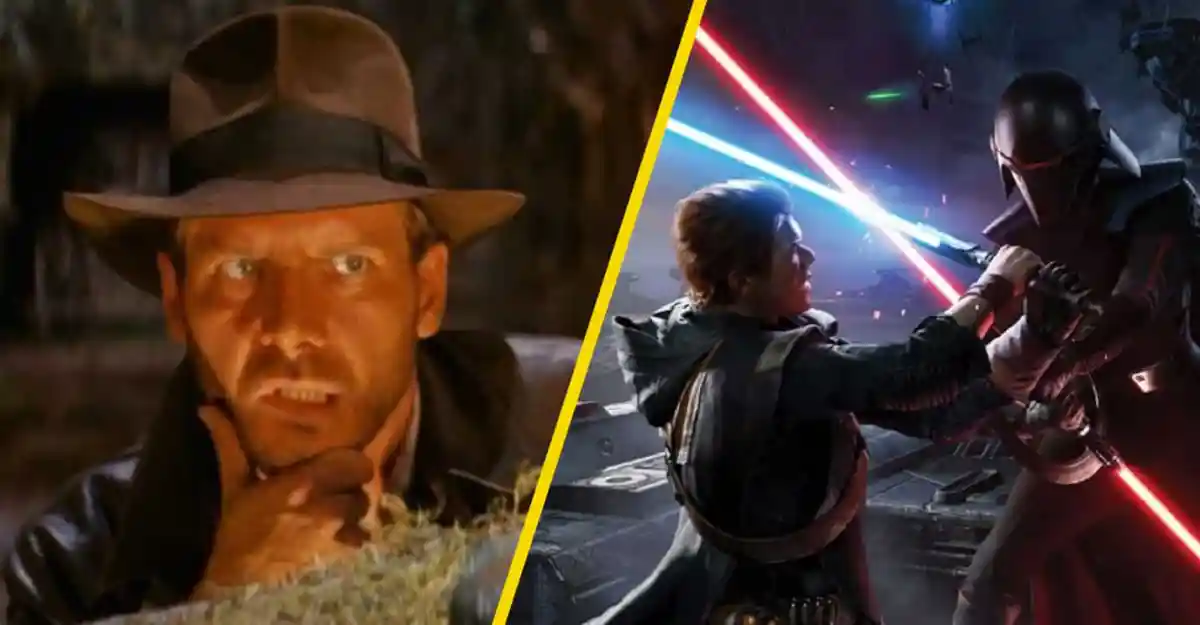An early contender for biggest surprise reveal of 2021 hit today as Bethesda announced that MachineGames, the studio behind the recent Wolfenstein games, is working on an Indiana Jones project. The game will be produced by Bethesda’s Todd Howard, tell an original story, and fall under the newly announced Lucasfilm Games umbrella. Though few would have expected this marriage of developer and IP, it makes sense when you think about it — if there’s one person who hates Nazis more than B.J. Blazkowicz, it’s Dr. Henry Walton Jones Jr.
This news came on the heels of Disney announcing that all Star Wars games will now fall under the new aforementioned moniker of Lucasfilm Games. This includes recent hits like Star Wars Battlefront II, Star Wars Jedi: Fallen Order, and Star Wars: Squadrons, as well as upcoming games like Lego Star Wars: The Skywalker Saga. This is obviously a smart way for it to keep all of its projects, including collaborations within games like Fortnite and Minecraft, under a single roof.
It also makes sense to do this now, as the 10-year deal between EA and Disney is set to expire in 2023. While that seemed like the distant future in 2013, it feels much more immediate in 2021. And while I don’t see Disney completely severing ties with EA, given that Jedi: Fallen Order’s commercial and critical success means that we’ll be seeing a sequel to Cal’s underappreciated adventure, it allows Disney and Lucasfilm to branch out and diversify in a similar way that Marvel has with its properties and studios like Insomniac, Crystal Dynamics, Capcom, and Team Ninja.

But while the news and the accompanying sizzle reel just focused on Star Wars, the rebranding of Lucasfilm Games clearly has the potential to draw both directly and indirectly from a rich history that includes so much more than just a galaxy far, far away. And sure enough, the Indiana Jones reveal proved just that, though it came with its own set of questions. Namely, given that Microsoft is close to officially acquiring Zenimax, will this Bethesda / MachineGames project be an Xbox exclusive? We’ll have to wait and see on that, but if it is, that would be a pretty substantial counter to Sony’s Uncharted.
A lot of folks associate LucasArts primarily with Star Wars classics of all different genres. And honestly, rightfully so. Whether it was tough-as-nails platformers like the Super Star Wars trilogy, flight sims like X-Wing vs. TIE Fighter, shooters like the Dark Forces / Jedi Knight series, or RPGs like Knights of the Old Republic, it really was a golden age for Star Wars games, no matter which genre or platform you might be interested in. But at the same time, LucasArts was known as a pillar of creativity, as it developed and published iconic adventure games, earlier groundbreaking Indiana Jones experiences, beloved cult classics, and brand new ideas that are ripe for revisiting.
If the name Lucasfilm Games sounds familiar, that’s because it’s what LucasArts was originally called for nearly its first decade of existence. Through the early ‘90s, its most notable games were Maniac Mansion from Ron Gilbert and Gary Winnick and The Secret of Monkey Island, also directed by Gilbert and co-designed by a young Tim Schafer. These two games helped pave the way for some of the most iconic adventure games of the ‘90s, many of which were developed by LucasArts itself.
Following The Secret of Monkey Island, we got a stretch of some of the absolute funniest games ever created. From Day of the Tentacle and Full Throttle to my personal favorite, Grim Fandango, LucasArts and Schafer were involved with some of the seminal PC experiences of the ‘90s, which have, for the most part, thankfully been remastered and ported to most modern platforms. After the decade, the point-and-click adventure torch was carried off in several directions, including by Double Fine, Telltale Games, and a wealth of even smaller indie teams.

But for that brief period of time, Lucas was synonymous with pushing the boundaries of comedy in video games. And there’s no reason why it can’t be again. And given how they’re open to working with developers from across the world like Machine Games, it would be exciting to see these properties possibly make it back into the hands of their original creators.
Still in the adventure genre, we had 1992’s Indiana Jones and the Fate of Atlantis, which stands up as a much better sequel to the original trilogy than Kingdom of the Crystal Skull. It seems like this game’s success helped usher in the rise of Tomb Raider and subsequently Uncharted. And with the news of Bethesda’s upcoming Indiana Jones project, it just feels right that the franchise that inspired some of the biggest franchises in modern gaming is coming back. In 2005 we saw some early footage of Indiana Jones and the Staff of Kings, a game meant to launch during the PlayStation 3 and Xbox 360 generation, but obviously that game never came to fruition.
The ‘90s also saw lesser-known games from LucasArts that weren’t based on a beloved property but nevertheless garnered a devout fanbase. This included 1993’s Zombies Ate My Neighbors on SNES and Sega Genesis, a wonderfully campy cooperative action game that ping-pongs across dozens of different subgenres of horror. I’d love to see what a modern version would be like, including all of the new horror tropes that have risen over the past few decades. In fact, the game is apparently still in line to receive the popular spiritual successor treatment in the form of the aptly titled Demons Ate My Neighbors, though its September 2020 Kickstarter campaign failed to meet its goal.

The list of interesting non-Star Wars LucasArts properties goes on. Herc’s Adventures for PlayStation 1 was a trip through Greek mythology filled with action, humor, and a Disney-like charm, and I kept thinking back on it recently as I played through Ubisoft’s Immortals Fenyx Rising. And later on came the Mercenaries games, filled with the kind of bombastic action, hyperactive physics, and sandbox nonsense that feels right at home in our modern streaming and clip-sharing world.
Now to be clear, I’m not saying that Lucasfilm Games’ first order of business should be to greenlight sequels to all of these old games that I remember fondly. Obviously, getting its vision for the future of Star Wars in line is its top priority. However, we know from the recent Disney Investor Day that the dozen or so Star Wars film and streaming projects in the works will also be joined by James Mangold’s Indiana Jones film, as well as a Willow series for Disney+. And with the Bethesda / MachineGames news, it’s clear that the games division is taking a similar cue in finding talented developers who can diversify its lineup with other interesting properties from Lucas’ past, present, and future. I’d love nothing more than to see Lucasfilm Games return to that same pillar of creativity that LucasArts stood for so many decades ago, and this upcoming Indiana Jones project is certainly a step in the right direction.






Published: Jan 12, 2021 5:32 PM UTC